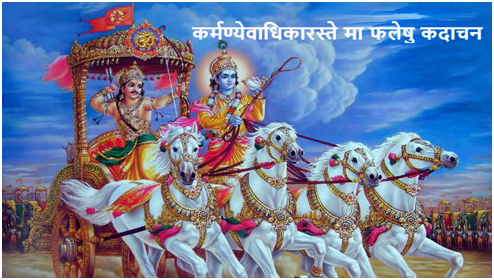
“कर्मण्येवाधिकारस्ते मा फलेषु कदाचन । मा कर्मफलहेतुर्भुर्मा ते संगोऽस्त्वकर्मणि ॥”
One of the most important verses of the Bhagavad Gita, Karmanye Vadhikaraste Ma Phaleshu Kadachana, was spoken by Lord Krishna to Arjun on the battlefield of Kurukshetra during the epic Mahabharata.
Let’s see what does this mean: Karmanye Vadhikaraste, Ma phaleshou Kada chana — You have the right to perform your actions, but you are not entitled to the fruits of the actions.
Ma Karma Phala Hetur Bhurmatey Sangostva Akarmani — Do not let the fruit be the purpose of your actions, therefore you won’t be attached to not doing your duty.
Indeed, this message comes from Bhagavad Gita, Chapter 2, Verse 47, where Lord Krishna advises Arjun to focus on his duty without attachment to the results.
This profound teaching emphasizes the importance of selfless action and is central to the philosophy of Karma Yoga — performing one’s duty without attachment to the fruits of action
This verse holds a universal message, transcending time, religion, and geography, resonating deeply with the philosophy of life and action.
Translation of the Verse:
“You have the right to perform your duties, but you are not entitled to the fruits of your actions. Never consider yourself the cause of the results of your activities, nor be attached to inaction.”
This teaching, delivered at a crucial moment, addresses Arjun’s moral and emotional conflict as he hesitates to fight in a war against his relatives, teachers, and friends.
Krishna’s words carry wisdom that applies not only to Arjun’s situation but also to our everyday lives.
Arjun’s Dilemma:
Arjun asks Krishna‘, ’ What’s the use of fighting against my own for just a piece of land? What happiness will I get by slaying my dear ones?
The ones on the other side are my uncle and my cousin. Won’t I be sinning? What will I get by killing all of them? Instead, I would have preferred that they kill me here.’
Arjun found himself paralyzed by doubt and sorrow. Facing his family, friends, and revered elders on the opposite side, he questioned the morality of fighting and contemplated abandoning his duty as a warrior. Lord Krishna, serving as his charioteer and guide, imparted spiritual wisdom to help Arjun overcome his indecision.

Krishna explained that every individual has duties (dharma) to fulfill, and shirking them out of fear or attachment leads to greater harm.
Inaction or avoidance cannot absolve one of responsibility, particularly when justice and righteousness are at stake.
“Slain, you will attain heaven; victorious, you will enjoy the earth. Therefore, stand up, Arjun, resolved to fight.” (Bhagavad Gita, Chapter 2, Verse 37).
Krishna’s teachings were designed to restore Arjun’s clarity and commitment to his path.
The Essence of the Teaching
1. Focus on Effort, Not Outcomes
Krishna’s message underscores the importance of performing one’s duties without attachment to results.
By detaching from the outcomes, one can work with greater focus and serenity.
2. Selfless Action
The verse advocates for selflessness in action.
Instead of seeking personal gain, one should act for the greater good or as an offering to a higher purpose. s.
3. Avoidance of Inaction
Krishna warns against inaction, which can be just as harmful as improper action.
True fulfillment comes from taking meaningful steps in alignment with one’s responsibilities.
Relevance in Modern Day Life
The teachings of Karmanye Vadhikaraste remain incredibly relevant in today’s fast-paced, goal-oriented world.
We often find ourselves overwhelmed by the pressure to succeed or consumed by worry over results.
This philosophy can provide clarity and balance in various aspects of life:
1. In Professional Life
Whether in business or career, success often depends on consistent effort rather than fixation on outcomes.
2. In Personal Relationships
Relationships become more meaningful and less transactional by focusing on giving and fulfilling our roles — as a parents, partners, or friends — without expecting returns.
3. In Spiritual Practice
The verse inspires individuals to pursue their spiritual paths with devotion and without attachment to immediate results or enlightenment, emphasizing perseverance over instant gratification.
Conclusion
Karmanye Vadhikaraste is not merely a call to action, but a guide to living a life of purpose, balance, and inner peace.
By performing our duties sincerely, free from attachment to rewards, we can cultivate resilience, focus, and a deeper connection to the world around us.
Just as Krishna’s words empowered Arjun to rise above his doubts and embrace his dharma, this timeless wisdom has the power to guide us through life’s challenges with strength and grace.
Note: In Bhagavad Gita, As It Is, By Swami Prabhupada, the part Ma Karma Phala Hetur Bhur means, never to consider ourselves to be the cause of the result of our activities.
When we do something, we are not supposed to take credit for the fruit of our actions. We consider it our duty, so we did it.
Today how many of us believe in this principle? What does this verse mean to us today? Await your responses.
Follow me on my profile section on envigblogs.com

Comments
Post a Comment